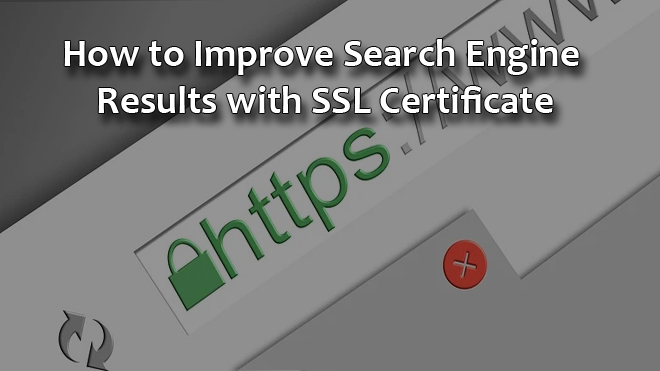According to a recent study, at least 68% of users feel unprotected by the current laws despite being vulnerable to security threats. So, to make the virtual world safer for internet users, Google stepped in and laid down the rules for websites that wished to rank higher. Back in 2014, Google declared that SSL certificates would be a ranking factor for websites in Google’s search results. The Search Engine Giant further added that if there were two similar websites, then the one with an SSL certificate would rank higher than the one without.
This declaration took the world of SEO by storm because Google, the world’s leading search engine, is known to be secretive about how its algorithm works. At all times, Google’s algorithm and its ranking factors focus on ensuring a better user experience.
So, Google always adds up new parameters that enable it to crawl through millions of websites and pull out the best results. However, back in the year 2014, Google did something different.
The Search Engine Giant declared that websites running on HTTPS would get a few extra brownie points when it came to ranking. A sharp spike followed that declaration in the number of websites that installed SSL certificates. However, Google has over two hundred ranking factors, and an SSL certificate is just one of them. So, does that work in 2020? Let us find out.
What is an SSL Certificate?
An SSL certificate is a digital certificate that encrypts communication between the web server and the client by making use of the Hypertext Transfer Protocol Secure (HTTPS). So, when website owners install an SSL Certificate on the webserver, then it no longer runs on the Hypertext Transfer Protocol (HTTP), which exchanges data as plain text and is easy to intercept. Since HTTPS makes use of public key-private key authentication, it ensures a secure exchange of data between the server and the client.
Read Also:
The website owner controls the private key, which remains confidential, and the public access remains public. So, when the client transmits data to the server, then it does so using a public key that decrypts the data. This decrypted data is then accessible only through the private key, which remains on the webserver and is under the website owner’s control. So, the data exchanged between the server and the client via HTTPS is secure. Unlike in the case of HTTP, this data cannot be sniffed by cybercriminals who use this tactic to steal sensitive data.
How to choose an SSL Certificate to Boost SEO?
Your choice of an SSL certificate depends on the type of business you run and your website’s architecture. Based on these factors, you can choose an SSL certificate that helps you gain the trust of your users and protect their best interests. Let us now explore your options to find the best SSL certificate for your website.
Domain Validated SSL Certificate
The DV SSL certificate is ideal for blogs, information portals, or small businesses seeking an online presence. However, it only reflects that the domain and its ownership have been verified. This is done through an email sent to the domain owner, often to an @domain email ID. The domain owner then receives a private key on the same email ID. This key then needs to be pasted on the server, where it remains and does what it is supposed to do. If your domain has multiple subdomains, then it is always better to choose a Wildcard SSL certificate that encrypts your domain and all its subdomains as well.
Organization Validated SSL Certificate
The OV SSL certificates confirm the name and address of the entity and are therefore more credible than the domain-validated SSL Certificates. It is ideal for small and mid-sized businesses that wish to build more credibility by undergoing a more detailed validation process.
Extended Validation SSL Certificate
The EV SSL certificate indicates that the Certifying Authority has validated the existence and legality of a business. It is ideal for larger businesses such as eCommerce websites, government websites, financial services providers, etc.… As the EV SSL certificate makes use of 2048-bit encryption, it is the most secure.
Although all SSL certificates encrypt the server-client communication using cryptographic keys, they are not the same. Since SEO is all about delivering a better user experience, it is recommended that you choose an SSL certificate that involves a more comprehensive validation process. So, it would be wise to select an EV or OV SSL certificate rather than a DV SSL certificate.
How Does SSL Certificate improve SEO?
Now that you know what SSL certificates are and how they work, it is time to figure out how SSL Certificates improve your website’s SEO. Before we dive deeper, you must understand what distinguishes Google from other search engines. The answer is straightforward — an algorithm that is designed to improve user experience by pulling out results that match the user’s search intent.
Higher Credibility
The first five seconds that an average user spends on a website determines that user’s next action. So, you need to engage the user with compelling content and design. Sadly though, none of your efforts is going to bear fruit if your browser tells the user that your website is not secure—most browsers flag websites without an SSL certificate as potentially dangerous, which lowers their credibility.
You can fix this with an SSL certificate, which the browser indicates with a green padlock in the URL bar. With the rapid increase in cybercrime, users do not wish to risk their privacy by browsing such websites.
Read Also: Top 7 Best Free Plagiarism Checker – A Good Idea
Reduces bounce rate
According to SEMrush, the bounce rate of domains that rank in the top three positions is 49%. That means, 49% of users jump off those websites despite all the checks that Google’s algorithm puts them through.
For all other websites, the average bounce rate is somewhere between 56% to 70%. A website’s high bounce rate indicates a terrible user experience and profoundly impacts its SEO. To rank better, website owners must devise strategies that can keep the bounce rate low.
You were wondering what can lower your website’s bounce rate? Delivering great content and providing better online security to the user can dramatically reduce your bounce rate. You can do this by creating content based on the user’s search intent and by putting the user’s mind at ease by installing an SSL certificate.
Better Security
SSL certificates provide better security to users by encrypting communication between a server and the client. It reassures the user that none of the user’s data would be traced or intercepted by someone else. Internet users crave anonymity, and unless a website provides them with what they need, they may not want to browse through it.
Also, laws such as the General Data Protection Regulation Act (GDPR) that applies to the European Union (EU) lays down the need for HTTPS to protect the privacy of EU citizens. So, using an SSL Certificate helps website owners comply with the GDPR requirements and provides better security to users, which contributes to better user experience.
Ecommerce SEO
Ecommerce websites aim at reaching out to users who are more likely to buy their products or services. That makes it inevitable for eCommerce websites to level-up their SEO efforts, and in 2020, that goes far beyond optimizing product descriptions. Instead, eCommerce websites must try to improve their security measures because the very nature of eCommerce websites calls for it.
According to a study conducted by Price Waterhouse Coopers, economic crimes account for about 42 billion US Dollars in losses. So, no informed user would want to make any purchases from an eCommerce website that is flagged by the user’s trusted browser. After all, the stakes are high, and their financial details are at risk. However, when you make use of an advanced SSL certificate, you earn more trust because the user knows that a Certifying Authority has validated your business. That makes it easier for internet users to trust you.
As you may have realized, eCommerce websites require a higher degree of authentication, and that is only possible by installing an EV SSL certificate. As your business operates online, this certificate helps you establish your identity and also to comply with the Payment Card Industry Data Security Standard (PCI DSS) requirements with regards to data encryption.
Tip:
When optimizing your WordPress website for local SEO with the focus keyword “WordPress local SEO,” ensure your URL structure incorporates the keyword, choose a readable permalink structure like “Post name,” and create location-specific URLs if applicable. Use hyphens to separate words, implement redirects and canonical tags for any changes or duplicates, and focus on keyword-rich and user-friendly URLs to boost visibility and click-through rates.
Conclusion
Providing visitors with superior user experience is the goal of every search engine, including Google. One way of doing that is by choosing the right SSL certificate to encrypt server-client communication and providing users with better security and more privacy.
Doing this will have a direct impact on several other ranking factors such as bounce rate, engagement rate, etc.… which Google considers while ranking websites. Therefore, based on user sentiment and the data that we have analyzed, we would like to conclude that SSL certificates continue to provide better user experience and can thus improve a website’s search engine ranking.









